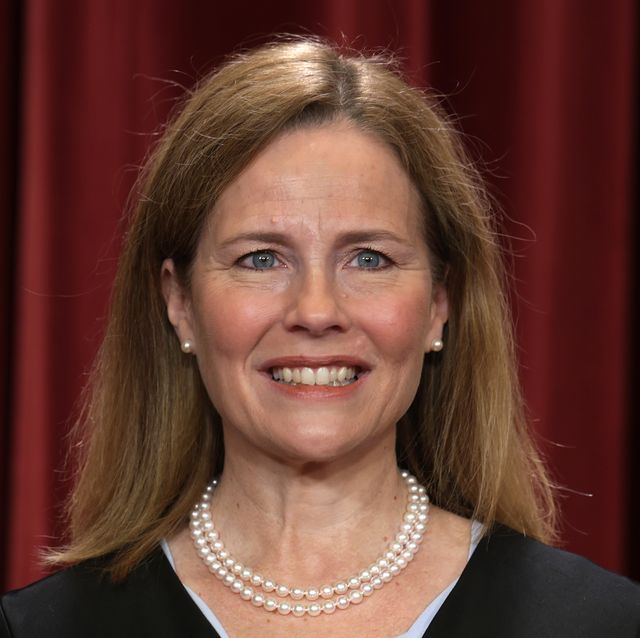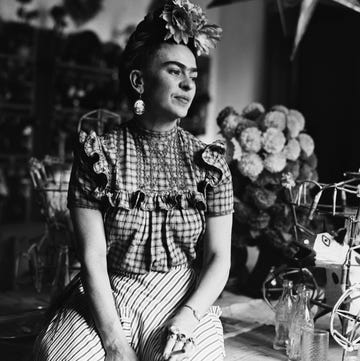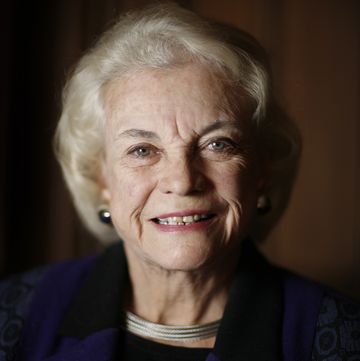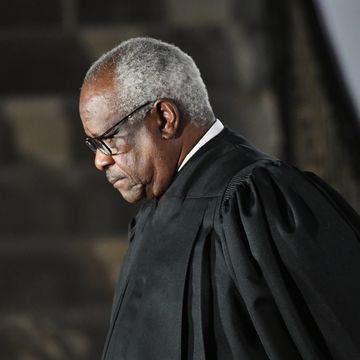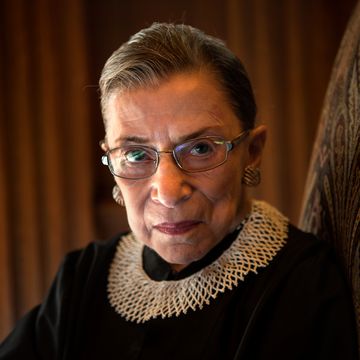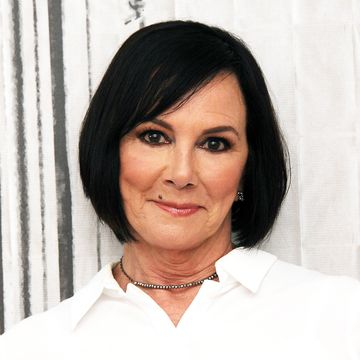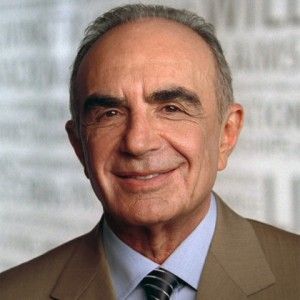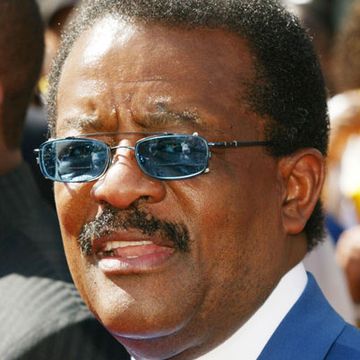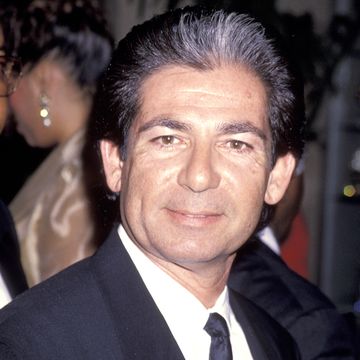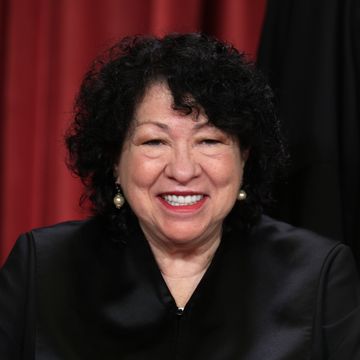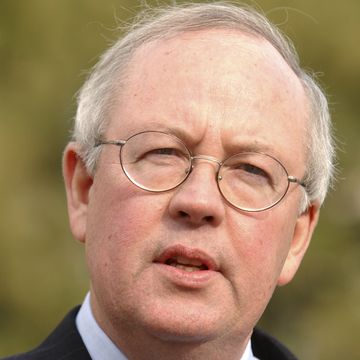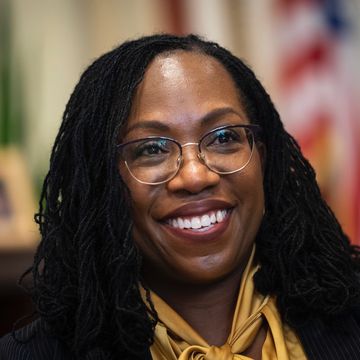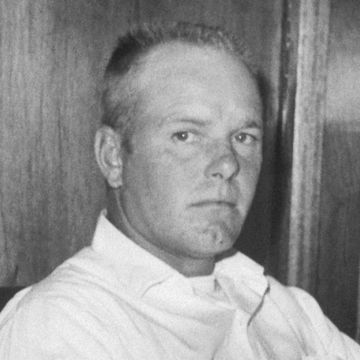(1972-)
Who Is Amy Coney Barrett?
Amy Coney Barrett was a top student at Notre Dame Law School before returning to her alma mater to become a distinguished professor. After three years on the bench for the United States Court of Appeals for the Seventh Circuit, the conservative judge was nominated by President Donald Trump to replace recently deceased Justice Ruth Bader Ginsburg on the U.S. Supreme Court in September 2020. The Senate confirmed her to the Supreme Court in October 2020.
Early Years and Education
Barrett was born Amy Vivian Coney on January 28, 1972, in New Orleans, Louisiana, the oldest of seven children. Her father, Mike, worked as an attorney for Shell Oil, while her mother, Linda, was a French teacher.
Raised in the suburban community of Old Metairie, the future judge received a Catholic education at St. Catherine of Siena elementary school and St. Mary’s Dominican High School, where she was named class vice president.
Barrett joined the ranks of Phi Beta Kappa at Tennessee's Rhodes College, graduating magna cum laude with a B.A. in English literature in 1994. She then graduated summa cum laude from Notre Dame Law School in 1997, where earned she earned the Hoynes Prize as the top student in her class and served as executive editor of the Notre Dame Law Review.
Early Legal Career
Post-graduation, Barrett clerked for Judge Laurence Silberman of the United States Court of Appeals for the District of Columbia Circuit, followed by a year in the same capacity for Supreme Court Associate Justice and conservative icon Antonin Scalia.
Barrett joined the prestigious Washington, D.C., law firm of Miller, Cassidy, Larroca & Lewin in 1999, before making the pivot to academia in 2001 with a stint as the John M. Olin Fellow at Law at George Washington University Law School.
Notre Dame Law Professor
Barrett returned to Notre Dame Law School as an assistant professor in 2002, eventually becoming a full-tenured faculty member renowned for her expertise in the subjects of federal courts, constitutional law and statutory interpretation. She was thrice voted Distinguished Professor of the Year and held the Diane and M.O. Miller Research Chair of Law from 2014-17.
Barrett also began developing a national profile during these years for her staunch conservative and Catholic beliefs. In 2012, she signed a statement that criticized President Barack Obama's Affordable Care Act (ACA) mandate that contraceptives be covered by health insurance plans as a "grave violation of religious freedom." Three years later, she signed a letter to Catholic Bishops that praised "the value of human life from conception to natural death" and "family founded on the indissoluble commitment of a man and a woman."
Seventh Circuit Appeals Court
In May 2017, Barrett was nominated by President Trump for a seat on U.S. Court of Appeals for the Seventh Circuit, which covers Illinois, Indiana and Wisconsin.
The September confirmation hearing made headlines for Democratic attempts to determine whether the nominee would be unduly influenced by her religious beliefs, with California Senator Diane Feinstein asserting at one point that "the dogma lives loudly within you."
Barrett was ultimately confirmed in October 2017 by a 55-43 vote, with Democrats Tim Kaine, Joe Manchin and Joe Donnelly crossing the aisle to give their support.
Opinions and Interpretations
During her three years on the Seventh Circuit bench, Judge Barrett authored approximately 100 opinions that bolstered her reputation as a textualist and originalist in the mold of her mentor, Scalia:
Second Amendment Rights
In 2019's Kanter v. Barr, Barrett was the lone voice of dissent in a decision that prohibited a man convicted of a white-collar crime from possessing a firearm. "Founding legislatures did not strip felons of the right to bear arms simply because of their status as felons," she wrote.
Immigration
Barrett again dissented the following year when Cook County v. Wolf upheld the blockage of Trump's "public charge" rule that made it difficult for immigrants relying on public assistance to earn green cards. Describing the administration's stance as "not unreasonable," Barrett insisted the courts were "not the vehicle" for resolving controversial policy disputes.
Additionally, the judge has offered her thoughts on key legal and political matters through her writing and speeches:
Stare Decisis
In a 2013 law review article, Barrett declared that she was not beholden to the doctrine of stare decisis, which asks a court to follow the precedents set in similar cases. "I tend to agree with those who say that a justice's duty is to the Constitution and that it is thus more legitimate for her to enforce her best understanding of the Constitution rather than a precedent she thinks clearly in conflict with it," she wrote.
Abortion
Barrett's view of stare decisis has fueled critics who believe she intends to overturn the 1973 Roe v. Wade decision that legalized abortion. The pro-life judge has spoken at length on the complexity of the topic, from the wisdom of allowing non-elected judicial appointments to decide the issue to the process of preventing public funding for abortions, though she noted in a 2013 lecture that it was unlikely the landmark ruling would be overturned.
Affordable Care Act
In a 2017 article, Barrett criticized Chief Justice John Roberts' upholding of the ACA by characterizing the financial penalty imposed on those without health insurance as a tax. "Chief Justice Roberts pushed the Affordable Care Act beyond its plausible meaning to save the statute," she wrote.
Supreme Court Nomination and Election
On September 26, 2020, President Trump nominated Barrett to replace recently deceased liberal trailblazer Ginsburg on the U.S. Supreme Court, calling Barrett a "woman of unparalleled achievement, towering intellect, sterling credentials and unyielding loyalty to the Constitution."
As it was Trump's third Supreme Court nomination, after Neil Gorsuch and Brett Kavanaugh, the selection further charged an already contentious election-year battle between the president and his Democratic challenger, Joe Biden. Four years earlier, Senate Majority Leader Mitch McConnell had refused to hold hearings for Obama's Supreme Court nominee, Merrick Garland, on the grounds that the public should be allowed input by voting for the next president. This time, however, McConnell and his Republican colleagues set the confirmation process in motion with Election Day just weeks away.
On October 22, the Senate Judiciary Committee voted unanimously to advance Barrett's nomination to the Supreme Court, and on October 26, she was confirmed to the Supreme Court in a 52-48 vote, solidifying the court's conservative majority. She was sworn in by Justice Clarence Thomas.
Husband and Family
Barrett has seven children with her husband, Jesse, a fellow Notre Dame alum and former federal prosecutor. Two of their kids are adopted from Haiti and their youngest child has Down syndrome.
Organizations and Personal
Barrett has been involved with the Federalist Society, the American Law Institute and the Notre Dame anti-abortion group Faculty for Life. Additionally, she and her husband are reported to be members of People of Praise, a Christian group in which adherents abide by a lifelong "covenant" of loyalty and look to spiritual advisers to make personal decisions.
A resident of South Bend, Indiana, during her years as a law professor, Barrett joined the board at South Bend's Trinity School at Greenlawn and was known as a devoted fan of the Notre Dame football team.
QUICK FACTS
- Birth Year: 1972
- Birth date: January 28, 1972
- Birth State: Louisiana
- Birth City: New Orleans
- Birth Country: United States
- Best Known For: Amy Coney Barrett served as a law professor and appeals court judge before being elected as a U.S. Supreme Court justice in October 2020.
Fact Check
We strive for accuracy and fairness.If you see something that doesn't look right,contact us!
CITATION INFORMATION
- Article Title: Amy Coney Barrett Biography
- Author: Biography.com Editors
- Website Name: The Biography.com website
- Url: https://www.biography.com/law-figure/amy-coney-barrett
- Access Date:
- Publisher: A&E Television Networks
- Last Updated: October 27, 2020
- Original Published Date: September 28, 2020
QUOTES
- If you can keep in mind that your fundamental purpose in life is not to be a lawyer, but to know, love and serve God, you truly will be a different kind of lawyer.
- What greater thing can you do than raise children? That's where you have your greatest impact on the world.
